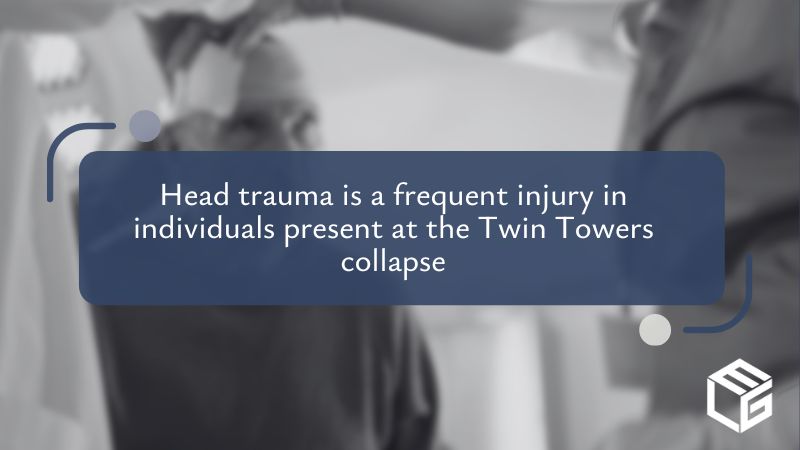-
About »
- Insulin MDL
-
Cases »
- Diseases
- Testimonials
- Government
- Contact
- Get Help Now
-

Head traumas are one of the most significant injuries faced by those exposed to the nightmare of the 9/11 terrorist attacks. Head traumas also referred to as traumatic brain injuries (TBI), can have long-term, life-altering effects. Thousands of survivors, first responders, and clean-up workers still live with the consequences of their injuries, as they experience memory loss and physical impairments. Moreover, those who sustain TBIs are burdened with expensive medical treatments and loss of livelihood.
Fortunately, victims can file a claim for compensation through the 9/11 Victim Compensation Fund. If you or your loved one suffered from a 9/11-related head trauma, contact ELG Law today to start your claims process.
Claim ApplicationIndividuals who were in the vicinity of the World Trade Center during the collapse of the towers were at risk of head injuries from debris or being thrown against objects during the explosions and the subsequent chaos. Out of the survivors, about 44% were injured, and 13% of them sustained serious injuries, including head traumas, as reported in a study on persons injured during 9/11. Many head traumas from 9/11 victims have been attributed to the following causes:
The chaotic and horrific destruction of the World Trade Center resulted in a hazardous environment. Those present had an increased risk of suffering head traumas. Different types of head injuries include:
If you were diagnosed with one of these head injuries you may qualify for filing a claim. Did you sustain a 9/11-related head injury but did not find your diagnosis in the list above? Your healthcare provider may have documented your diagnosis with terms such as:
In addition to these types, head injuries may also be classified based on their severity. There are mild, moderate, and severe traumatic head injuries. Each kind presents different symptoms. For example, moderate to severe traumatic brain injuries may show symptoms as listed below, which are not typically associated with mild head injuries:
On the other hand, mild, moderate, and severe traumatic brain injuries share the following signs and symptoms:
Head injuries may also bring about changes in a person’s mood. The head trauma may manifest as anxiety, sadness, depression, aggression, irritability, and anger. Furthermore, traumatic brain injuries can cause sleep disruptions. If you experienced these symptoms and were diagnosed with a 9/11-related head injury, you may be eligible for compensation. Contact our lawyers to file a 9/11 Victim Compensation Claim for head trauma.
If you suffered a head injury during or after the 9/11 attacks, it’s important to know that you don’t have to go through the 9/11 Victim Compensation Fund (VCF) claims process alone. Our lawyers at ELG Law are ready to help you file your 9/11 VCF claim for head injuries. Contact ELG Law to get started on your claim today and get fair compensation to help you financially and physically recover from your 9/11-related injury.